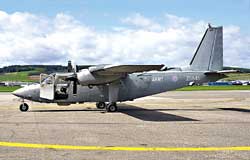 Two ex-British Army spy planes were handed over to the Royal Nepali Army's growing fleet of helicopters and fixed-wing aircraft. The British aid for the Britten Normal Islander AL Mk1 aircraft is derived from the Global Conflict Prevention Fund that debars the Nepal army from using them in any offensive combat.
Two ex-British Army spy planes were handed over to the Royal Nepali Army's growing fleet of helicopters and fixed-wing aircraft. The British aid for the Britten Normal Islander AL Mk1 aircraft is derived from the Global Conflict Prevention Fund that debars the Nepal army from using them in any offensive combat. The aircraft, which has seen action in Northern Ireland with the Royal Ulster Constabulary, is fitted with sensors for surveillance, imaging and night patrols. The short takeoff and landing Islanders can also carry up to 10 personnel each and have an endurance of four hours. "The plane can bring down the cost and difficulty of using night vision helicopters," said one army source who requested anonymity.
The plane can fulfil surveillance roles with a fuselage mounted turret containing an infra-red thermal imager and a colour daylight camera with telescopic lens for vertical and oblique pictures. The sensor can detect, identify and track individuals and vehicles over long distances in darkness and poor weather conditions. Army pilots have taken part in a week-long training on the Isle of Wight and helped ferry the planes to Kathmandu.
Under the terms of the agreement, the planes cannot be modified for use in combat even though it is equipped with four underwing stations for bombs, cannons and machine guns. Although the plane's equipment are not lethal, when combined with other aircraft and ground equipment it can increase the targeting capability of the offensive systems already in service with the Royal Nepali Army.
After opposition from peace groups, British Foreign Secretary Jack Straw told the House of Commons Defence Committee in February: "The planes are banned from being fitted for weapons or soldiers firing from open doors of the aircraft."
According to Jane's Defence Weekly, similar restrictions on sales of British military hardware to Indonesia have not been successful. The Global Conflict Prevention Fund is jointly administered by DFID and the Ministry of Defence, the foreign office and the treasury. In internal meetings, DFID is said to have expressed misgivings about the planes being delivered to Nepal.


